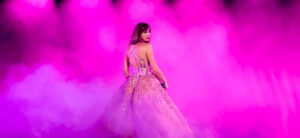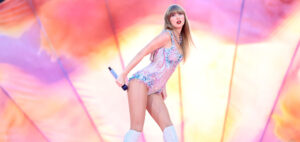Sabrina’s got that boy wrapped round her finger. Olivia knows she might sound crazy but she doesn’t care. Chappell is having a sexually explicit kinda love affair with a closeted woman. Billie is going to eat that girl for lunch, because it tastes like she might be the one. Charli wants you to guess the colour of her underwear. Renée is feuding with the worst bitch on earth. Summer 2024 is a bad girlie summer.
Anodyne injunctions to have a good time or vague sentiments about love are out. This year’s music invites you to party hard, feel your feels in all their glorious mess, and succumb to being frankly, fiercely horny. Musically, they cover everything from woozy dream-pop (Billie Eilish) to peppy guitar-led tracks (Olivia Rodrigo) to aggressively hooky dance music (Charli XCX); aesthetically, they run from Bardot-esque cutie (Sabrina Carpenter) to drag-act confrontational (Chappel Roan, with her mime makeup and wildly teased hair).
Some of its practitioners are barely in their twenties, having been famous since they were children — Eilish started releasing music at 13 and had her first hit at 15, while Carpenter and Rodrigo both came up through the Disney machine as teenagers. Some of them are old enough to be weighing nervous thoughts about having children of their own — “I Think About it All the Time”, on Charli XCX’s new album Brat, is a stark confrontation with her own biological clock, in which she wonders whether having a baby would “give my life a new purpose” or “make me miss my freedom”.
They don’t exactly comprise a scene. But together, they make up a constellation committed to the exploration of what you could broadly — and at least partly ironically — call “feminine chaos”. These are girls singing about girls, for girls.
I use the word “girl” advisedly, because even though all of them are adults, each has a pull towards the adolescent. You could call this infantilising, but I don’t think it is. After all, a lot of what they sing about is thoroughly adult — not just the desire and the heartbreak, but the lucid dissections of their professional life. (Charli XCX bemoans how much she cares about trade magazine Billboard on “Rewind” and Eilish worries quietly “am I on the way out?” on the opening track to her new album, Hit Me Hard and Soft.)
Girlhood instead denotes a certain unfinished state of femaleness. In some cases, that’s because they’re literally navigating the advent of adulthood in public (“When am I gonna stop being great for my age and just start being good?” wonders Rodrigo on “Teenage Dream” from the album Guts). For others, it’s because they know the fever of the teen years makes a good muse: leaning in, Charli XCX has called her album Brat.
There’s nostalgia for a time that was, if not nicer, certainly less crushingly bound by fear of cancellation. “I kinda miss the time when pop music was really volatile and crazy. I miss the Paris Hilton days,” said Charli XCX in an interview earlier this year. “Everybody is so worried about everything right now, how they’re perceived, if this art they’ve created is going to offend anyone… It limits creative output to think like that.”
But if the pop bad girls have a patron saint, it’s probably not Paris, it’s Regina George — the terrifying lunch hall tyrant of the movie-turned-musical Mean Girls. In the 2004 original, the plum part was good girl Cady, played by then-rising star Lindsay Lohan. But in the 2024 musical, the breakout role is Regina, played by Renée Rapp — openly ambitious, unapologetically vengeful, and knowing about sexism without seeing herself as a victim:
Regina: People say I’m a bitch, but you know what they would call me if I was a boy?
Cady: Strong?
Regina: Reginald. That’s what my mom was going to name me if I was a boy, so honestly I’d rather be “bitch”.
In the Millennial evolution, it’s not just about calling out the double standard that has girls condemned where boys are praised. It’s also about entertaining the possibility that there might be something valuable per se about the feminine way of exercising power. The first film’s big feminist moment is the speech given by Tina Fey as teacher Ms Norbury, in which she explains to her students that “calling each other sluts and whores… just makes it ok for guys to call you sluts and whores”. But what if you really are a bitch, and being a bitch is OK?
The mean girl can be aspirational, as Charli sings on her own song “Mean Girls”, which is not really about the film but rather about a certain type of woman “with the gravel drawl and dead eyes”, who seems to drive men demented with a mix of hatred and desire: “You said she’s problematic and the way you say it, so fanatic/ Think she already knows that you’re obsessed.” (She’s said it was partly inspired by Red Scare host Dasha Nekrasova.) What if, in fact, not everything girls do has to consider the male gaze?
This points to another subtle shift between the 2004 Mean Girls movie and the current iteration. Regina’s power has always been erotic — the girls she bullies want her, as well as wanting to be her. But in the new version, that dynamic is much more explicit, partly because Rapp herself is an openly “gay girl” (her words), even using one interview to ask Rachel McAdams, her predecessor as Regina, to date her. Regina 2024 is a confirmed lesbian icon. “Mean Girls, we watch it every night,” sings Roan in “Naked in Manhattan”, a song about girl-on-girl lust, “and we both have a crush on Regina George”.
Sapphic flirting is not exactly new to pop music. Cast your mind back to 2003, and the VMAs where Madonna, Britney Spears and Christina Aguilera performed a three-way kiss on stage. But in 2003, this was blatant play-acting for the male gaze with no implication of genuine desire: the coverage focused intensely on the shocked face of Spears’ ex, Justin Timberlake, who was watching from the audience. When Lohan was in a public and genuine lesbian relationship with DJ Samantha Ronson, the press was bitterly misogynistic: gossip blogger Perez Hilton, gay himself, pointedly styled Ronson’s name as SaMANtha.
But compare that with the convincingly graphic way Roan sings about being “knee deep in the passenger seat/ and you’re eating me out” on “Casual”; or Billie Eilish’s startlingly hot delivery of “oh my God her skin’s so clear/ she’s the headlights, I’m the deer” on “Lunch” — another reference to eating, because in 2024 pop lesbianism isn’t just touching lips to titillate the boys. There are many problems with the so-called “Gaylor” theory, which holds that Swift is a lesbian forced into the closet by record industry bigotry; but outside of the fact that Swift has categorically said it’s not true, the largest is probably that in a world of multiple hits by women about cunnilingus, coming out can no longer be considered a career killer.
It’s not that men don’t exist in the bad pop girl world — there are men in the songs (as objects of both desire and irritation), on the songs (as collaborators, often overlapping: Alexander 23 has worked with Rapp and Rodrigo, and Jack Antonoff with Swift and Carpenter), and in the audience. But the role of men in this music is very different from the one they might have had a generation or so back.
In my years as a teenage pop fan, the authority of the male svengali pulling the strings was unquestioned. Simon Fuller built the Spice Girls: a collection of archetypes rather than whole individuals (“Scary”, “Posh”, “Baby”). When they rebelled against him, he built S Club 7 — a brand, rather than a band, meaning that he would always control the intellectual property even if the individuals involved chose to walk away. If the acts were exploited, so were the fans. Lou Pearlman (manager of the boybands Nsync and Backstreet Boys, convicted fraudster and alleged sexual predator of young men) once wrote that girls make the ideal audience because “they’ll buy just about anything and everything that their favourite performers endorse”.
That was an environment that made obedience the price of entry. You simply couldn’t become a pop star if you weren’t committed to take instruction and follow the beat. The dream, of course, was Britney Spears from 1998-2003: the perfect sexy woman-child who always did as she was told. The nightmare was Spears from 2004 on: the one who wouldn’t — or couldn’t — comply anymore and who lashed out at the cameras. The one who was wounded flesh and blood, rather than pure product.
The pop girls of 2024 have learned the lessons their forerunners — Spears, Hilton and Lohan among them — were burned for. Yes, you’ll be punished for being bad. But being good is a game you can only fail at, as Swift’s career has shown them. The grunge queen Courtney Love recently disparaged Swift’s music as a “safe space for girls”, and it’s true that for a long time that is what her public image offered, especially during the peak “squad” years around her 1989 album in 2014.
Then, Swift packaged her female friendships into an idealised girl gang, and paraded members of her inner circle on social media and in her stage shows. Later, she conceded that some of this had been performative, and it all fell apart in any case after a fallout with Kim Kardashian, in which certain squad members appeared to pick Kardashian over Swift. The “safe space” turned sour. In response, Swift turned her image inside out, creating a darker, angrier, more calculating version of herself.
“Baby boy, I think I’ve been too good of a girl/ Did all the extra credit, then got graded on a curve,” she sang ruefully on “Bejewelled” in 2022. Following the rules is just embracing the standard by which you’ll ultimately be judged to fail. The bad pop girls know this. They know it, and so does the audience they’re making music for: an audience that’s sweet, flawed, kind, cruel, mostly female and perfectly human in all its untidy emotions. The boys can sing along if they like, but it’s not really for them, or about them. Whether they’re allies, lovers or antagonists, this year music’s main characters are the girls.
***
This article was first published on 1 July, 2024.
Disclaimer
Some of the posts we share are controversial and we do not necessarily agree with them in the whole extend. Sometimes we agree with the content or part of it but we do not agree with the narration or language. Nevertheless we find them somehow interesting, valuable and/or informative or we share them, because we strongly believe in freedom of speech, free press and journalism. We strongly encourage you to have a critical approach to all the content, do your own research and analysis to build your own opinion.
We would be glad to have your feedback.
Source: UnHerd Read the original article here: https://unherd.com/



